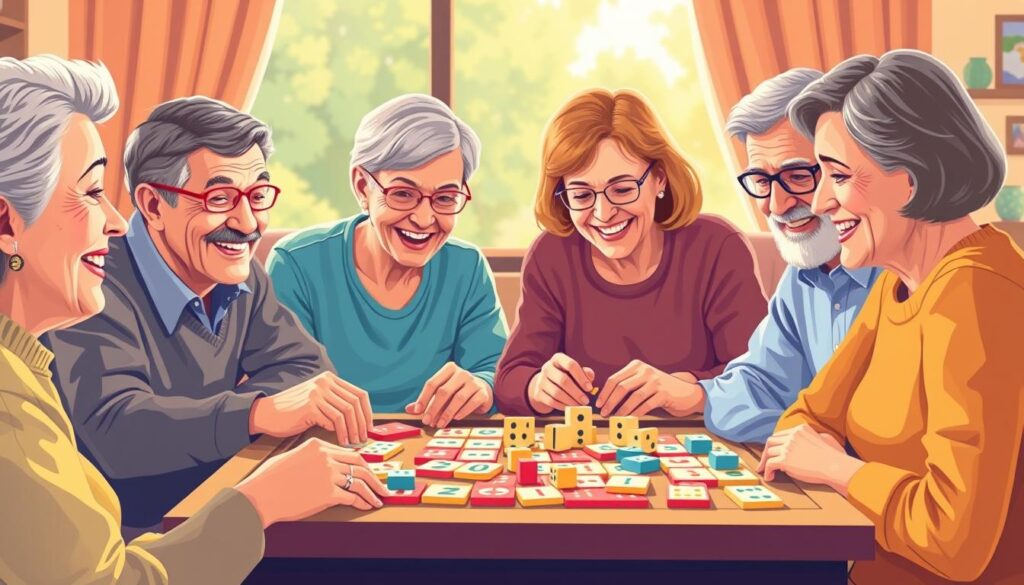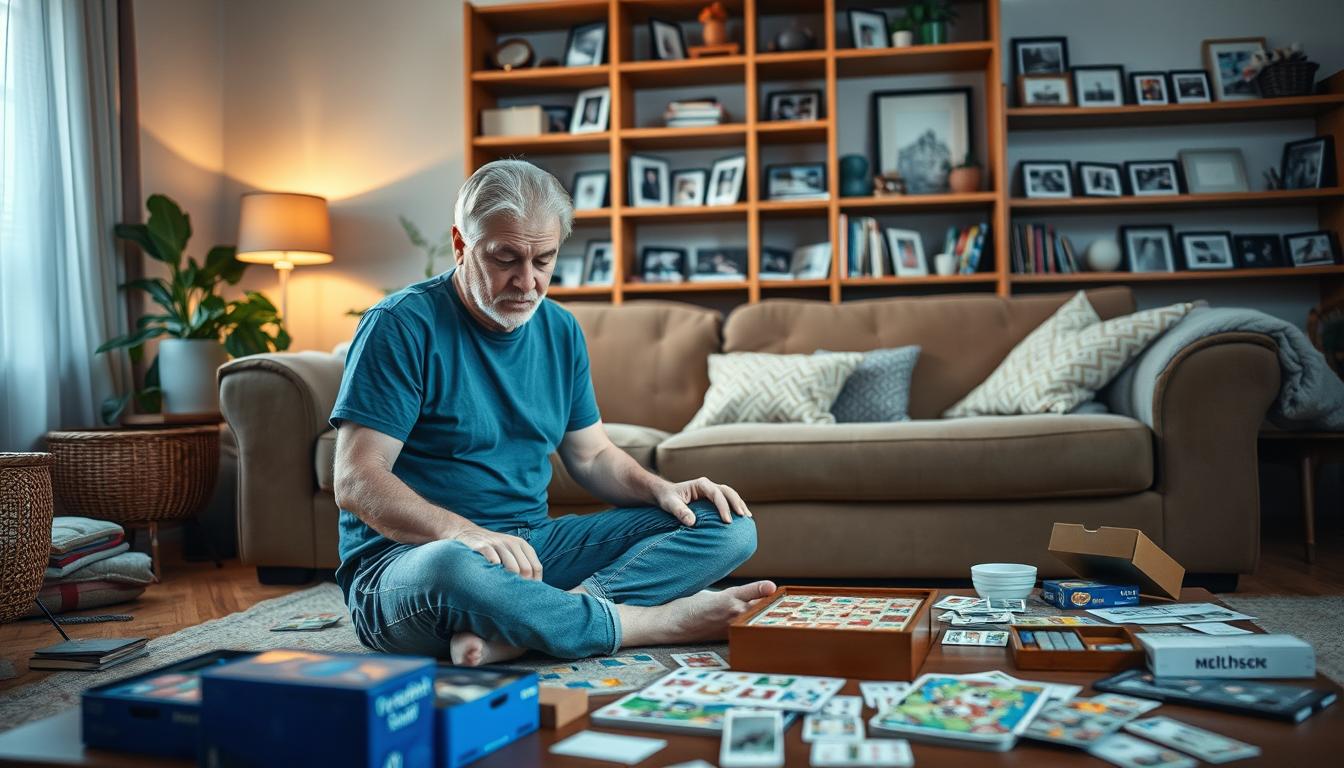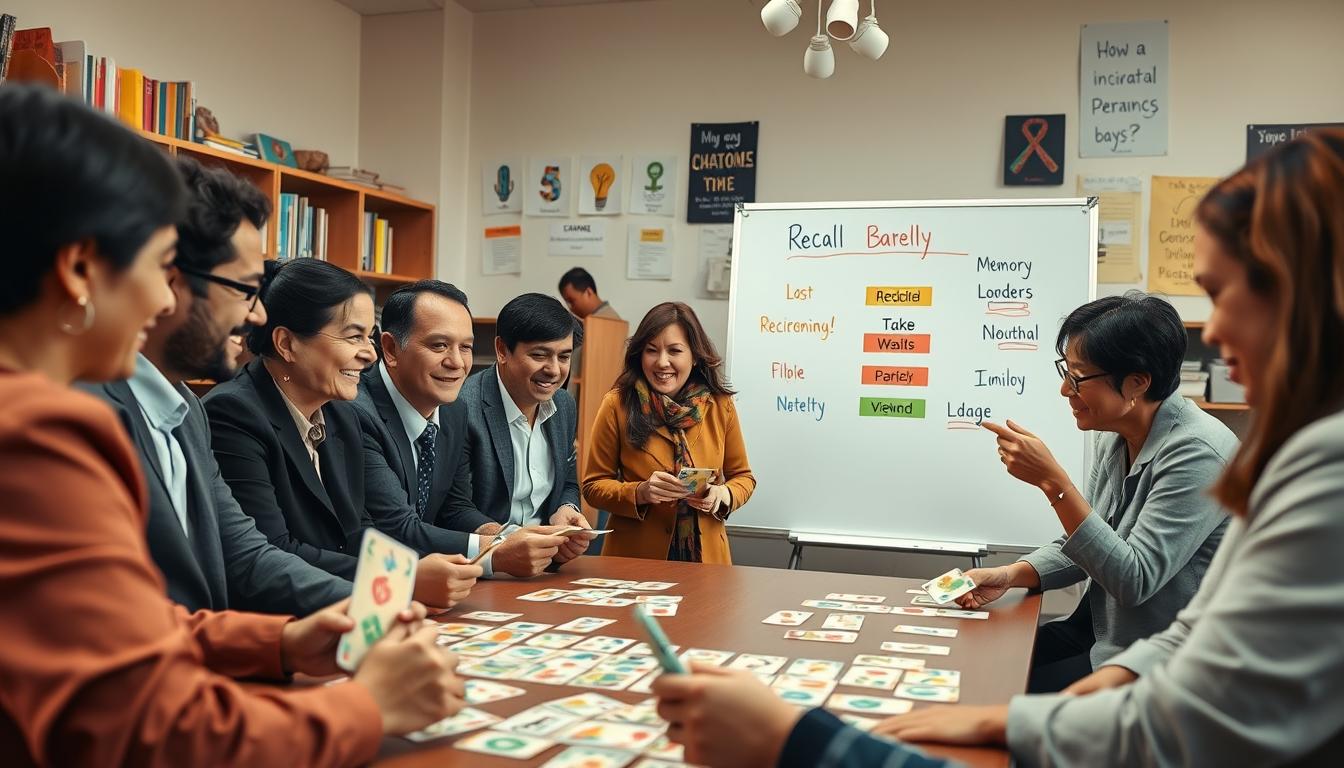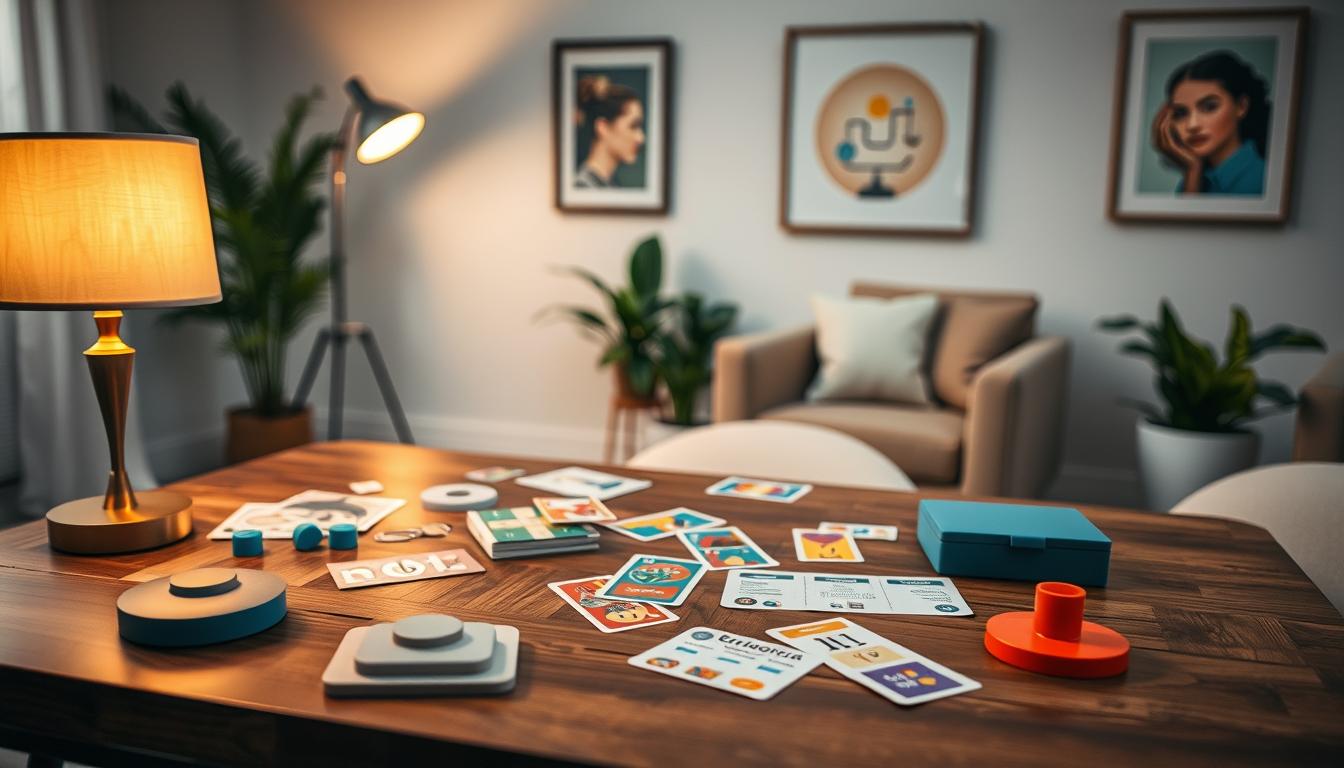Games to recover old memories in adults with minor memory blocks
Ever thought games could bring back cherished memories that seem lost? As we get older, many adults face minor memory blocks. This makes it hard to connect with their past. But, there’s hope through engaging episodic memory games.
These games are not just fun. They also help keep our brains sharp. They offer a way to enjoy reminiscing and reconnect with our past. Let’s dive into how these games can help recover memories and support our cognitive health as we age.
The Importance of Memory Games for Adults
Memory games are key for older adults’ brain health. They offer fun and boost mental sharpness. For those facing aging’s effects, these games are crucial.
Studies show they boost confidence and encourage socializing. Players feel a sense of achievement, improving their mental health. Memory games also help build connections, benefiting both personal and social life.
As we age, it’s vital to keep our brains active. Adding memory games to our daily lives can improve our brain health. This makes them a great choice for keeping our minds sharp as we get older.

Understanding Memory Blocks in Aging Adults
As adults age, they may face memory blocks. These are challenges in remembering things or doing everyday tasks. These problems can really affect brain functioning, causing frustration and confusion.
Memory blocks can get worse with dementia. People might find it hard to remember names, dates, or even what they talked about recently.
It’s important to understand what memory blocks are. Aging can change how our brain connects, leading to forgetfulness or poor judgment. This decline can also affect how we reason and feel emotionally.
Knowing the signs of memory blocks is key. It helps find the cause, like vitamin shortages or thyroid issues. Early action and support can help aging adults improve their brain health and fight memory problems.
How Brain Games Stimulate Cognitive Function
Playing brain games is a great way to boost cognitive function, especially for seniors. These games help improve memory and thinking skills. They also support overall brain health.
Research shows that brain games can make our brains work better. They help us stay sharp and focused. This can slow down the natural aging process of the brain.
Brain games can improve memory, attention, and problem-solving skills. They make our minds more agile. This helps us tackle everyday tasks with ease.
These games don’t just keep our brains sharp. They also prepare us for learning new things. It’s a win-win for our mental health.
The Role of Episodic Memory Games in Memory Recovery
Episodic memory games are a fun way to help people with memory issues. They bring back personal experiences and feelings of nostalgia. This helps a lot in getting memories back.
These games make players think about their own life events. They help remember specific moments and create strong emotional bonds. This boosts cognitive benefits.
Definition and Benefits of Episodic Memory Games
Episodic memory games aim to recall memories from a player’s past. They connect to personal history, making memory recall better. The nostalgic parts of these games make players think about good times.
This leads to better emotional health and brain function. Playing these games is not just about remembering. It’s about having fun, improving memory, and feeling connected through shared experiences.
Types of Games for Cognitive Stimulation
Cognitive stimulation games are key to keeping our minds sharp. They offer fun and help improve memory and thinking skills. Word puzzles and jigsaw puzzles are two types that boost brain health.
Word Puzzles: Delaying Memory Decline
Word puzzles like crosswords and anagrams are great for the brain. They make us think and spot patterns, slowing down memory loss. By solving these puzzles, we strengthen our brain connections and improve language skills, helping us remember better.
Jigsaw Puzzles: Enhancing Visuospatial Skills
Jigsaw puzzles are also great for the brain. They help us think critically and improve our sense of space. Doing these puzzles regularly sharpens our minds and boosts memory.
Card Games and Their Cognitive Benefits
Playing card games is great for your brain, especially as you get older. Games like Solitaire, Bridge, and Uno boost your memory and strategic thinking. You have to remember cards, sequences, and plans, which keeps your brain sharp.
Research shows that playing cards regularly can make your brain work better. It helps you remember things and think strategically. Plus, playing with others can make you feel good and improve your mental health.
Engaging in Board Games for Memory Enhancement
Board games are fun for families and friends. They also help improve memory. Games like Monopoly, Chess, and Trivial Pursuit are great for the brain. They challenge us and help us stay mentally sharp.
Popular Board Games for Mental Stimulation
Many board games are both fun and mentally challenging. Here are some top games for your brain:
- Monopoly: Teaches strategic thinking and money management.
- Chess: Improves problem-solving and planning ahead.
- Trivial Pursuit: Boosts memory and trivia knowledge.
- Scrabble: Increases vocabulary and word skills.
- Pictionary: Encourages creativity and communication through drawing.
Studies show playing these games can slow down brain aging in older adults. Playing together as a family improves everyone’s memory and thinking skills.
| Board Game | Main Cognitive Benefit | Recommended Age |
|---|---|---|
| Monopoly | Strategic Thinking | 8+ |
| Chess | Problem Solving | 6+ |
| Trivial Pursuit | Memory Recall | 16+ |
| Scrabble | Vocabulary Enhancement | 8+ |
| Pictionary | Creativity and Communication | 8+ |
Playing board games regularly is a fun way to keep your mind sharp. Whether you’re competing or working together, these games are great for your brain.
Video Games: A Modern Approach to Memory Recovery
Video games are a new way to help older adults with memory problems. They use cool graphics and interactive worlds to keep players interested. Playing 3D games helps people think better and remember more.
Studies show that some games can make seniors better at remembering things and solving problems. This shows that games can be a fun way to help with memory. As technology gets better, game makers are creating games that help with brain health.
Nowadays, games are not just fun; they also make your brain work harder. Players get lost in amazing worlds while improving their thinking skills. This mix of fun and brain work shows how games can really help our minds stay sharp.
The Impact of Social Interaction Through Games
Playing group games does more than just entertain. It boosts memory and brain function, especially for adults with minor memory issues. It helps people connect and build strong relationships while keeping their minds sharp.
How Group Games Foster Connection and Memory
Group games make us talk and work together. They let us share moments, which can make our memories better. Feeling part of a group is key for our mental health.
| Type of Group Game | Benefits for Memory | Social Interaction Elements |
|---|---|---|
| Board Games | Improves strategic thinking and memory recall | Encourages teamwork and discussion |
| Team Sports | Enhances coordination and quick thinking | Fosters camaraderie and support |
| Trivia Games | Boosts factual memory and cognitive agility | Stimulates conversation and friendly competition |
Mobile Applications for Memory Improvement
In recent years, memory improvement apps have changed how we think about brain health. These apps offer personalized brain training to boost memory and mental sharpness. They make learning fun through interactive games that challenge your mind.
Smartphones make it easy for older adults to practice brain exercises anytime. Regular use of these apps helps create habits that improve memory. Digital games turn brain training into a fun activity, keeping minds sharp.
Apps like Lumosity and Elevate show how learning can be fun. They offer a variety of memory games. Users can see their progress and feel the benefits, keeping them motivated to stay mentally fit.
Other Activities That Support Cognitive Function
Doing different activities can really help your brain. Besides games, reading and arts and crafts are great for memory. They make you think creatively and keep your mind sharp.
Reading and Arts as Complementary Activities
Reading keeps your mind active. It helps you understand better, focus, and learn new words. It’s a key way to keep your brain healthy as you get older.
Arts and crafts, like painting or drawing, are also good. They improve your hand skills and help you see things in new ways. These activities make you think and remember better. Plus, they make you feel good, which is a bonus.
| Activity | Cognitive Benefits | Emotional Benefits |
|---|---|---|
| Reading | Enhances vocabulary, comprehension, and concentration | Provides relaxation and stress relief |
| Arts and Crafts | Improves fine motor skills and visual-spatial awareness | Encourages self-expression and creativity |
Creating a Balanced Cognitive Fitness Routine
Creating a balanced routine is key for keeping your mind sharp as you age. It should include memory training, exercise, and social activities. These help keep you healthy overall.
Playing cognitive games like puzzles can make your brain work harder. Exercise also boosts blood flow, which is good for your brain. Eating right and sleeping well make these efforts even more effective.
Don’t forget about social activities. Playing games with others or joining community events is great. It helps your mood and keeps your brain active.
Here’s a table showing what a balanced routine might look like:
| Activity Type | Examples | Benefits |
|---|---|---|
| Cognitive Games | Puzzles, Memory Training Apps | Enhance problem-solving skills and memory retention |
| Physical Activities | Walking, Yoga, Dance | Improve circulation and reduce stress, fostering brain health |
| Social Engagement | Board Games, Group Outings | Encourages social bonding and collaborative problem-solving |
| Lifestyle Changes | Healthy Diet, Sleep Hygiene | Supports overall health maintenance and cognitive function |
By following a well-rounded routine, you can boost your memory and live a healthier life. It’s good for both your mind and body.
Recommended Memory Recovery Strategies
Effective memory recovery strategies are key for adults with minor memory issues. Doing different types of cognitive training boosts brain activity and memory. Puzzles, trivia, and memory games are fun ways to improve your mind.
Adding exercise to your day is great for your brain. It makes blood flow better, helping your memory. Eating well, with foods full of antioxidants and omega-3s, also helps your brain.
Feeling good emotionally is just as important. Doing things that make you think of happy times, like talking with family, strengthens your memory. Keeping in touch with friends and family also helps your brain stay sharp.
Using a mix of these strategies is the best way to improve your brain. It helps you remember better and keeps your mind strong.
Conclusion
Memory improvement is key for aging adults with minor memory issues. Playing traditional board games, digital games, or episodic memory games is fun and effective. These activities challenge the mind and help people feel connected.
Keeping the mind active is vital for a better quality of life. Older adults can fight memory loss by playing games and doing mental exercises. This makes their golden years more vibrant and fulfilling.
Memory games do more than just entertain. They boost brain functions, help with social interactions, and let older adults regain their mental strength. Playing these games is a great way to keep the brain healthy and happy.
FAQ
What are memory games and how do they help older adults?
Memory games are activities made for older adults to boost their brain power. They help keep the mind sharp and can even slow down memory loss. These games are fun and good for the brain.
Why do adults experience memory blocks?
Memory blocks in older adults often come from aging-related brain changes. These changes can make it hard to remember things and do everyday tasks. It’s important to know why this happens to find ways to get better.
What are episodic memory games?
Episodic memory games bring back personal memories and feelings. They help improve remembering specific events and experiences. This makes the brain healthier and strengthens emotional connections.
How do brain games promote cognitive function?
Brain games challenge the brain to pay attention and focus. This helps grow new brain cells. Studies show that playing these games regularly can make memory and attention better in older adults.
What types of games can enhance cognitive stimulation?
Many games can boost brain health. Word puzzles like crosswords, jigsaw puzzles, and card games like Solitaire and Bridge are great. They help keep memories sharp.
How do board games benefit cognitive health?
Board games challenge the mind and offer social fun. Games like Chess, Monopoly, and Trivial Pursuit can slow down brain aging. They improve problem-solving and memory skills.
What role do video games play in memory recovery?
Video games, especially 3D ones, can improve brain processing and memory. Research shows they can make recognition memory and executive functions better in older adults.
How important is social interaction in memory games?
Playing games with others is key for emotional well-being. It boosts memory, mood, and social bonds. Sharing experiences strengthens memory and emotional health.
Are there mobile applications available for enhancing memory?
Yes, there are apps to help improve memory and brain health. These apps offer quick games for memory, making it easy for older adults to exercise their brains regularly.
What other activities can support cognitive function?
Reading, arts, music, and crafts also benefit the brain. They spark creativity, improve memory, and bring joy. These activities are good for brain health.
How can I create a balanced cognitive fitness routine?
A good routine mixes games, physical activities, and social time. This mix keeps the brain healthy and slows down aging.
What are some effective strategies for memory recovery?
Good strategies include playing cognitive games, doing activities that bring back memories, eating well, exercising, and staying connected with others. These help keep memory sharp.














